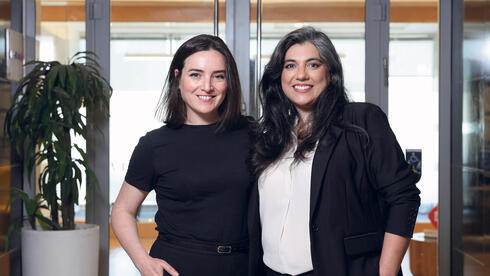
"Global reliance on Israeli tech is strategic for the future of Israel"
Michal Kissos Hertzog, CEO of Poalim Tech, was speaking after meeting with Shani Eliyahu-Gross, CEO and co-founder of PolyMERit, which took place as part of the Growth+ project.
Michal Kissos Hertzog, CEO of Poalim Tech, met with Dr. Shani Eliyahu-Gross, CEO and co-founder of PolyMERit, which is developing a medical device designed to be inserted into the body during surgery to stop bleeding and heal tissue.
The conversation took place as part of the Growth+ project by Calcalist and Poalim Tech, now in its second year. The initiative aims to strengthen the resilience of Israel’s high-tech sector through a series of one-on-one meetings between experienced entrepreneurs and early-stage startup founders. The goal: to offer guidance, support, and knowledge on entrepreneurship, innovation, startup management, and building companies with long-term growth potential.
Michal, what’s a recurring challenge that early-stage entrepreneurs tend to face?
Kissos Hertzog: “Many people want to launch a huge company that’s ready on day one—but nothing big is built in a day. When I speak to entrepreneurs, I encourage them to start small. First, test the idea against the market before building something massive. You need to identify a real need, test it, and find true product-market fit. Otherwise, you risk spending time, money, and resources—only to discover that the product isn’t needed.
“Even today, when AI can help build an app in minutes, it still can’t replace the fundamental question: ‘What problem am I solving?’ The search for product-market fit is still a uniquely human challenge.”
Shani, what’s been the biggest challenge you’ve faced this year?
Eliyahu-Gross: “Without a doubt—resources. Every early-stage startup grapples with a lack of resources, whether it’s funding, talent, or even credibility. Getting investors to believe in you is tough. We operate like Sayeret Matkal, the elite reconnaissance unit, because everything rests on a tiny foundation. That resource scarcity lies at the heart of most internal struggles and obstacles.”
Related articles:
Michal, what advice would you offer Shani in navigating these limitations?
Kissos Hertzog: “When resources are tight, every mistake becomes very expensive. We talked about how to do things that can scale faster and cost less.
“In fields like healthcare and foodtech, Israeli innovation has the potential to become essential and irreplaceable in people’s daily lives around the world. That kind of global reliance on our technology is not just good for a particular startup—it’s strategic for the future of Israel. That’s why ventures like Shani’s matter deeply to me.”
What did you learn from each other?
Eliyahu-Gross: “Michal is a true inspiration—both personally and professionally. Her openness, her ability to connect, and the impressive career path she’s taken all moved me deeply. I also learned from her about advancing women in tech and the importance of nurturing the broader ecosystem.”
Kissos Hertzog: “What I take away most is Shani’s resilience—what she went through with her previous company, the journey she’s on now, and her personal story. She’s managed to stay relevant by constantly adapting and evolving. At the same time, she demonstrates real inner strength: the ability to recover from setbacks and keep going.”
Tell us something surprising or memorable you discovered about each other.
Kissos Hertzog: “Shani shared that her daughter started a small business after October 7th as a way to disconnect from the news. She’s just 11 and already running a handmade greeting card venture—thinking about pricing, revenue, expenses. A real entrepreneurial mindset! It was absolutely charming.”
Eliyahu-Gross: “I realized just how much tech professionals in the financial sector contribute to the broader ecosystem—not just through banking services, but by offering real guidance, empowerment, and support. I’ve been a customer for years, and I didn’t fully appreciate the depth of that involvement until now.”
